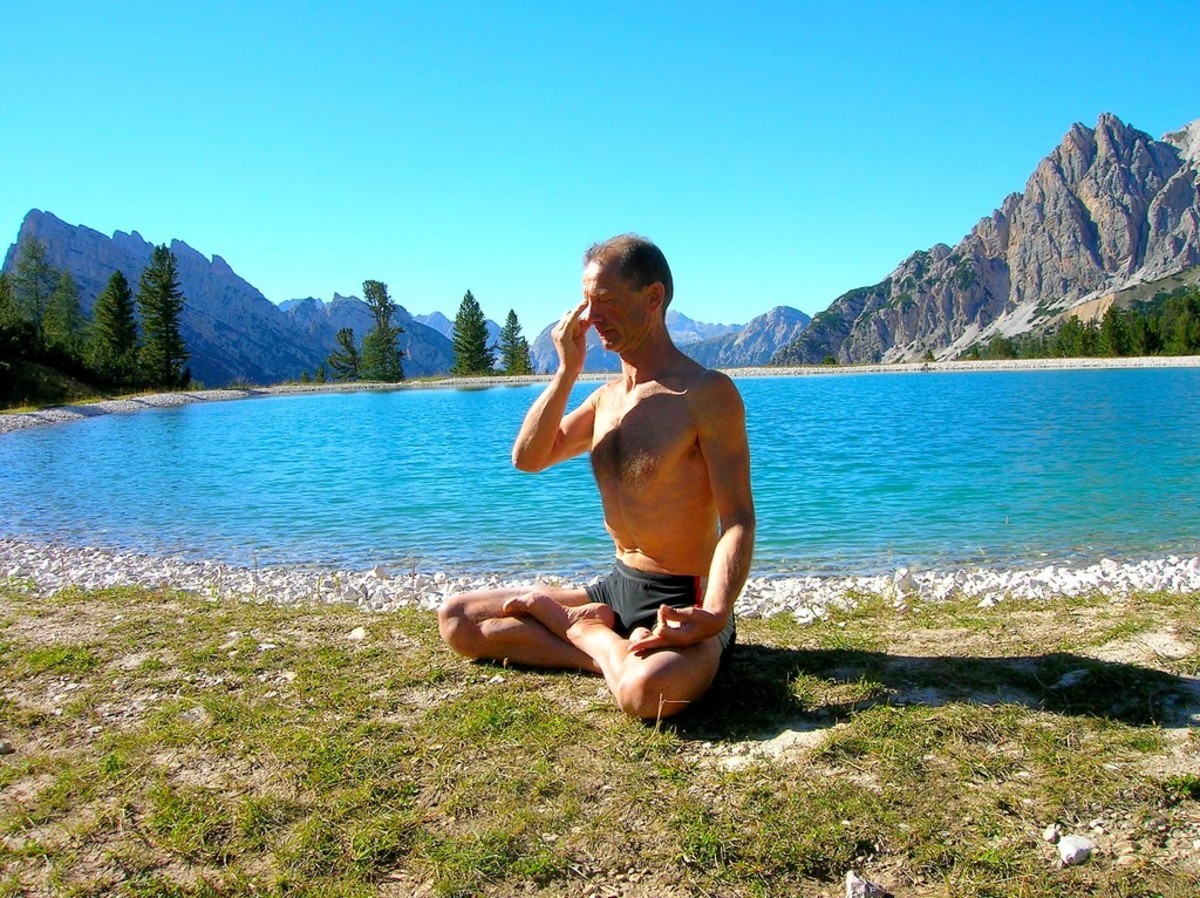How to Reduce Stress When Meditation Is Difficult

Our Attitude to Life
I think when tragic things happen, it is on the surface. It's like the ocean. On the surface a wave comes, and sometimes the wave comes, and sometimes the wave is very serious and strong. But it comes and goes, comes and goes, and underneath the ocean always remains calm. – H. H. The Dalai Lama
Life is ever-changing and many unforeseen events or situations arise that put a strain on our ability to cope and makes us feel out of control. It is this feeling of not being in charge of the situation that creates what we perceive as stress. Everyone reacts to stress differently, but the physiological responses are the same once we reach our individual stress threshold.
There is a lot of information available on what is stress, its causes, its effect on our physical, emotional and mental well-being and how to cope with it. The most common advice is to meditate to reduce stress. But, what can we do if we are so stressed out that we cannot imagine sitting quietly even for five minutes every day? The first step is to be able to recognize the symptoms of stress and identify it immediately so that we can be like the deep ocean and remain calm amidst stormy weather. The most important thing is our attitude that determines whether we suffer from stress or transform like charcoal into a diamond under the pressure.
Stress Symptoms: Physical, Emotional, Mental and Behavioural
The main reason the body becomes stressed is because it has not had a chance to re-balance the energies. Normally once stress is over, the parasympathetic nervous system will reverse the physical stress responses by:
- slowing down the heart rate
- re-stimulating digestion
- closing the pores
- helping the bronchi contract again
Thus the body, emotions, our mind and behavior change for the worse and we get into a vicious circle. Below are the symptoms that we can identify and be able to take immediate action to allow the body and mind to regain their energies:
Look Out for These Signs of Stress
Physical
| Emotional
| Mental
| Behavioural
|
|---|---|---|---|
tension in jaws, shoulders, stomach, chest
| anxiety
| lack of concentration
| excessive smoking
|
headaches
| depression
| forgetfulness
| excessive alcohol intake
|
palpitaions
| phobias
| inability to remember recent events
| overeating and binging
|
breathlessness when resting
| panic and panic attacks
| inability to take in new information
| eating nothing at all
|
fidgeting
| aggression
| inability to remember what you have just done
| neglecting personal appearance
|
tics
| feeling persecuted
| lack of coordination
| driving and/or speaking aggressively
|
dry mouth
| cynicism
| mind going round in circles
| withdrawing into yourself
|
sweating
| negativity
| indecisiveness
| avoiding social contact
|
dizziness
| fearing the worst
| irrational or rash decision making
| starting lots of things without finishing anything
|
exhaustion
| guilt
| being disorganized when normally you are well organized
| nail biting
|
stomach ache and 'butterflies' in stomach
| mood swings
| making more mistakes than usual
| hair-pulling
|
nausea
| weepiness
| becoming very fussy
| skin picking
|
increased need to urinate
| nightmares
| struggling with simple tasks
| obsessive thoughts
|
diarrhoea
| feeling abandoned
| compulsive actions (checking and rechecking locks, lights, taps, etc.)
| |
sleeping problems
| excess worrying
| ||
sexual problems
| loss of sense of humour
| ||
increased sensitivity to noise
| |||
sensitivity to bright lights
| |||
frequent infections
| |||
fluctuation in blood sugar levels
|
This list is from the book -- Total Stress Relief -- Practical Solutions that Really Work by Vera Peiffer. Judy Piatkus (Publishers) Limited, 2003
Mindfulness Meditation practice is the best way remain stress free throughout the day. There are short sessions that can calm you down during the day as well. Mindfulness is easy to learn and has great benefits.
4 Tips to Remain Calm and Relaxed All Day
The secret to remain stress free is to find ways to remain calm so you can cope better with the demands life makes on you. First step is to accept life as it is. Let go of the ideas on how things should be, rather accept the situation for what it is. We all have 24 hours in a day, we all have to wake up, work, deal with different people whether in the family or outside and then go to sleep to rest.
To attain stress relief when meditation is difficult requires a change in the way we do these daily activities and how we respond to them.
If a problem is fixable, if a situation is such that you can do something about it, then there is no need to worry. If it's not fixable, then there is no help in worrying. – H. H. The Dalai Lama
1. Have a Restful Sleep and Wake Up Refreshed
Whatever might be our life situation we all have to sleep at night. Those few moments before we fall asleep are in our hands. Here is a method I have found very helpful:
- Lie flat on your back
- Realize that the bed is holding up the weight of your body, not you.
- Relax all the muscles and nerves
- Relax from top of the head to the toe or vice versa
- Draw your attention to each group of muscles, tighten and let go.
- Feel the energy flow into that area and relax it.
- Imagine you are a piece of cloth on the bed, nothing else remains
- Visualize your body as pure energy, the clothes are lying limp on the bed
- It is good to repeat a mantra, a word, a prayer before going into sleep.
- Put life into the mantra, word or prayer, feel it vibrate.
- The body vibrates with the repetition and away you go into sleep.
If you do this every day you will notice that you wake up refreshed instead of tired and heavy in the morning. It might not work on the first night. Constant practice is necessary especially if you are so stressed out that you cannot sit for meditation.
2. Regulate Your Breath – Dealing with Daily Activities
As mentioned earlier we go into a fight-or-flight response when faced with a situation we think we cannot cope. To counter this can regulate our breathing to achieve a relaxation response.
- deep or diaphragmatic breathing enhances the relaxation response.
- your respiratory rate slows down
- heart rate slows down
- blood pressure dips
- pupils contract
- sweating is less
- the body comes out of emergency mode
The most astounding fact is that you can at will initiate this calming response by changing your breathing pattern.

3. Advantages of Deep Breathing
It is important to remember that 'Whatever you pay attention to changes in quality'. Paying attention to the breath at every opportunity will result in you breathing slowly and deeply as a matter of habit. There are many advantages to deep breathing:
- Deep breathing improves the efficiency with which we breathe.
- Oxygen enters the lungs and travels into millions of alveoli or tiny air sacs in the lungs.
- From there it enters the bloodstream through the surround blood vessels
- The arteries take the oxygen out to the brain, muscles, nerves and internal organs.
- Shallow breathing requires up to taking sixteen to twenty breaths per minute or 22,000-25,000 breaths per day.
- Deep breathing only requires six to eight breaths per minute, 10,000-12,000 per day, hence achieving the same result with half the effort.
- Deep breathing helps efficient cleansing of the body of carbon dioxide.
- You feel fresh and chirpy hence stress free.
If we you can be mindful about your breathing then you can face any challenge life throws your way, a difficult boss, caught in traffic, people shouting at you due to road rage, etc., all flow by without affecting you.
- Just Be: Accepting Life as IT IS
Just Be. Practice the skill to being present in the now by accepting circumstances as they are. Watch the circumstances change as your mind relaxes and you come up with creative solutions to deal with the situation. - Yoga Breathing Exercises, Pranayama
Yoga breathing techniques or pranayama are an ancient yogic tradition and can be easily applied to our modern lifestyles. It has many physical and mental health benefits that will help you enrich the quality of your life. - Meditation Results in Brain Growth
The brain is the most complex, powerful organism in the universe and taking care of it requires a holistic approach. Here are tips on nutrition, physical and mental exercises and meditation to improve brain health and brain growth.
4. Practicing Mindfulness All Day
Once you have incorporated the above practices into your life, you will find that on the whole you are much calmer. The mind is not as agitated as before, it is not going in circles and you are filled with more energy than you ever had. It will become easier to be mindful in everything you do. In fact it is very important to be mindful to avoid becoming stressed.
Do Only One Thing at a Time
Multi-tasking seems to be the order of the day however science is showing that it can hurt our ability to learn. It is also causing more stress in people. Studies suggest that when we multi-task a different part of the brain is involved in carrying out any one task, and it is not the part that is very efficient for memory and learning.
If you are already stressed out and are unable to remember recent events (see table above) and losing concentration it is a good idea to pay attention to only one task at a time. Being in the present is the best practice.
For example, when you are on a bus or train then do only that which you can at that moment, look out of the window, allow thoughts to float in and out, look at the people around you. If you are reading a book which you can do at any time or place then you are not enjoying the present moment. Or you might be busy texting someone, playing a game on the iPad, whatever takes the mind off the moment of being present with yourself can create stress.
Let go of the desire to be doing something all the time. Just Be. Practice being in the NOW. One way to do that is to observe your breath. Watch the breath going in and out, in and out, this will bring you into the consciousness of the moment. You will feel energized in no time.
These are only a few suggestions on how to gain stress-relief when meditation is difficult to include in your daily routine. However, by making the effort to make small changes at a time, you can achieve an overall calmness that will help you meditate on a regular basis. You can start off with a simple form of meditation and reap the benefits in no time.








